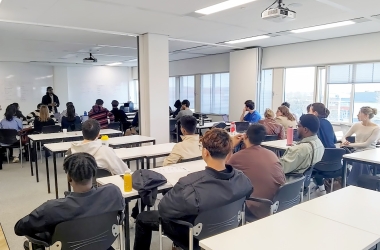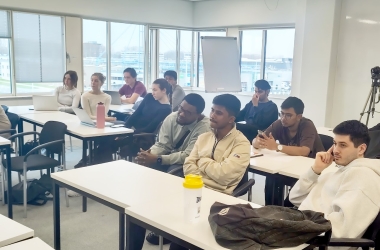Students Discuss Fair-Trade Coffee During Biannual Intercollegiate Debate

Activity Gathers Wittenborg Students and US Students from IES Study Abroad Programme
Wittenborg students from the EBA (Entrepreneurial Business Administration) programme recently participated in an intercollegiate debate with US students from the IES Study Abroad programme in Amsterdam. The central topic was fair-trade coffee as a solution to farmer poverty, but the debate also touched on sustainability, transparency in the supply chain and corporate social responsibility.
Wittenborg senior lecturer Amy Abdou organised and moderated the debate. In preparation, students from both programmes were supplied with academic articles, news articles and documentaries. The participating students formed teams around different stakeholder positions to discuss whether or not fair trade should be implemented on a larger scale and what that would require from the stakeholders. Each team outlined their stakeholder’s position and their vision for the future. Some teams looked into the opportunities and ethical dilemmas around coffee production (see more details of the discussion below).
This biannual debate has become a tradition at Wittenborg where students have an opportunity to develop their argumentation and presentation skills. Afterwards, the group was treated to a lunch with Tony's Chocolonely as dessert and the students from both programmes were able to socialise and network. The biannual debate takes place in March and October of each year and is open to all EBA and MBA students who wish to participate.
According to Abdou, by joining the debate students are provided with a real-world example that involves products they consume on a daily basis. This allows them to apply what they have learned in the courses ‘Sociology and Organisational Behaviour’ and ‘Management, Leadership and the Organisation’.
“In both classes, students are challenged to think about changing norms and practices in the workplace. In the debate, they are able to apply theoretical perspectives around the organisation of work while also contemplating the evolving ethical and moral framework. The debate is set up to facilitate a dialogue between various stakeholders. This creates empathy for all producers and service providers in the supply chain. It also allows students to reflect on the consumer choices they make.”
She adds that when students are offered dilemmas, they can better understand free market dynamics. “On the one hand, we teach profit maximisation is important, but it can also come at a cost to certain communities. If we are to teach the SDGs, we have to look at some of the contradictions of traditional business practices and reassess their value in a 21st-century world.”
German student Leila Keller, pursuing an EBA degree in Entrepreneurship and Digital Marketing, described the debate as both an enjoyable exercise and a valuable way to observe the diverse perspectives and motivations within the fair-trade landscape. She highlighted that a key takeaway was the necessity of raising further awareness not only among consumers, but also among the farmers and workers.
“On top of that, we had the opportunity to forge connections with new people, particularly through the collaboration with the US exchange students. So, this debate fostered our personal growth and broadened our intellectual horizons by enriching our understanding of the world,” Keller said.

Summary of the discussion
The team representing the multinational corporations (e.g. Starbucks) opened the debate with a plea for an open and democratic marketplace where companies lead their own initiatives to enhance the farmer efficiency and promote sustainable farming practices. They argued that fair trade had not reached a mass audience and was an ineffective solution to the farmers' dilemma.
This position was met with resistance from the group representing the farmers, who pointed to their vulnerable position in a volatile market. In 2024, the coffee industry saw unprecedented profits while farmers' wages have been in decline for more than 20 years. Most coffee farmers live in poverty and some live in extreme poverty.
The farmers also mentioned the effects of climate change on their crops and government corruption in their list of grievances. They argued fair trade was a beginning, but it did not go far enough in terms of farmer protection, while participating in fair-trade programmes was expensive for farmers because they needed to invest in new equipment.
The team representing governments in coffee-exporting countries highlighted the importance of exporting tropical agricultural products for their country. They stated job retention was their main priority. They supported fair-trade initiatives and referenced their inability to secure a good price for the farmers on the international market due to tariffs.
The team representing the consumers were unsure about fair trade and felt that there was confusion about what the fair-trade premium meant. The value was not clearly expressed, which led the group to conclude that fair trade is only as effective as the awareness around the concept.
The team representing the social entrepreneurs made the argument that in a better world, social entrepreneurship would not exist because every company would be sustainable and fair. The social entrepreneurs argued they would support fair-trade initiatives by partnering with co-operatives to create a link between the consumer and the producer. They felt the presence of fair-trade products allows consumers to support healthy market relationships where both producers and consumers prosper.
The group representing the NGOs were also in favour of fair trade as a starting point from which farmers could partner with existing organisations to build schools and healthcare facilities in the areas where coffee is grown.
WUP 30/05/2024
by Amy Abdou & Ulisses Sawczuk
©WUAS Press